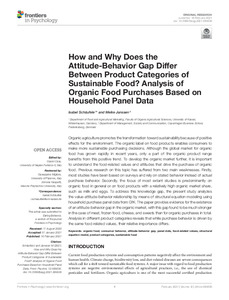| dc.date.accessioned | 2021-03-12T11:57:09Z | |
| dc.date.available | 2021-03-12T11:57:09Z | |
| dc.date.issued | 2021-02-16 | |
| dc.identifier | doi:10.17170/kobra-202103123504 | |
| dc.identifier.uri | http://hdl.handle.net/123456789/12627 | |
| dc.description.sponsorship | Gefördert durch den Publikationsfonds der Universität Kassel | |
| dc.language.iso | eng | |
| dc.rights | Namensnennung 4.0 International | * |
| dc.rights.uri | http://creativecommons.org/licenses/by/4.0/ | * |
| dc.subject | organic food | eng |
| dc.subject | consumer behavior | eng |
| dc.subject | attitude-behavior gap | eng |
| dc.subject | panel data | eng |
| dc.subject | food-related values | eng |
| dc.subject | structural equation model | eng |
| dc.subject | product categories | eng |
| dc.subject | sustainable food | eng |
| dc.subject.ddc | 630 | |
| dc.title | How and why does the attitude-behavior gap differ between product categories of sustainable food? Analysis of organic food purchases based on household panel data | eng |
| dc.type | Aufsatz | |
| dcterms.abstract | Organic agriculture promotes the transformation toward sustainability because of positive effects for the environment. The organic label on food products enables consumers to make more sustainable purchasing decisions. Although the global market for organic food has grown rapidly in recent years, only a part of the organic product range benefits from this positive trend. To develop the organic market further, it is important
to understand the food-related values and attitudes that drive the purchase of organic food. Previous research on this topic has suffered from two main weaknesses. Firstly, most studies have been based on surveys and rely on stated behavior instead of actual purchase behavior. Secondly, the focus of most extant studies is predominantly on organic food in general or on food products with a relatively high organic market share, such as milk and eggs. To address this knowledge gap, the present study analyzes the value-attitude-behavior relationship by means of structural equation modeling using household purchase panel data from GfK. The paper provides evidence for the existence of an attitude-behavior gap in the organicmarket, with this gap found to bemuch stronger in the case of meat, frozen food, cheese, and sweets than for organic purchases in total. Analysis in different product categories reveals that while purchase behavior is driven by the same food-related values, their relative importance differs. | eng |
| dcterms.accessRights | open access | |
| dcterms.creator | Schäufele, Isabel | |
| dcterms.creator | Janssen, Meike | |
| dcterms.extent | 13 Seiten | |
| dc.relation.doi | doi: 10.3389/fpsyg.2021.595636 | |
| dc.subject.swd | Biologisches Lebensmittel | ger |
| dc.subject.swd | Nachhaltigkeit | ger |
| dc.subject.swd | Verbraucherverhalten | ger |
| dc.subject.swd | Kaufverhalten | ger |
| dc.subject.swd | Verbraucherpanel | ger |
| dc.type.version | publishedVersion | |
| dcterms.source.identifier | EISSN 1664-1078 | |
| dcterms.source.journal | Frontiers in psychology | eng |
| dcterms.source.volume | Volume 12 | |
| kup.iskup | false | |
| dcterms.source.articlenumber | Article 595636 | |


